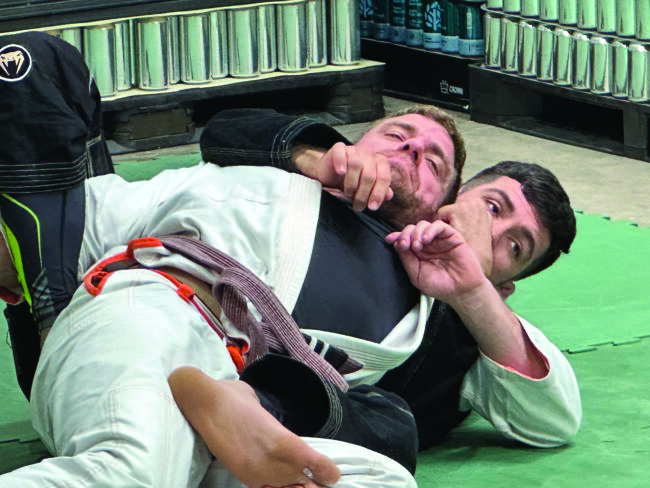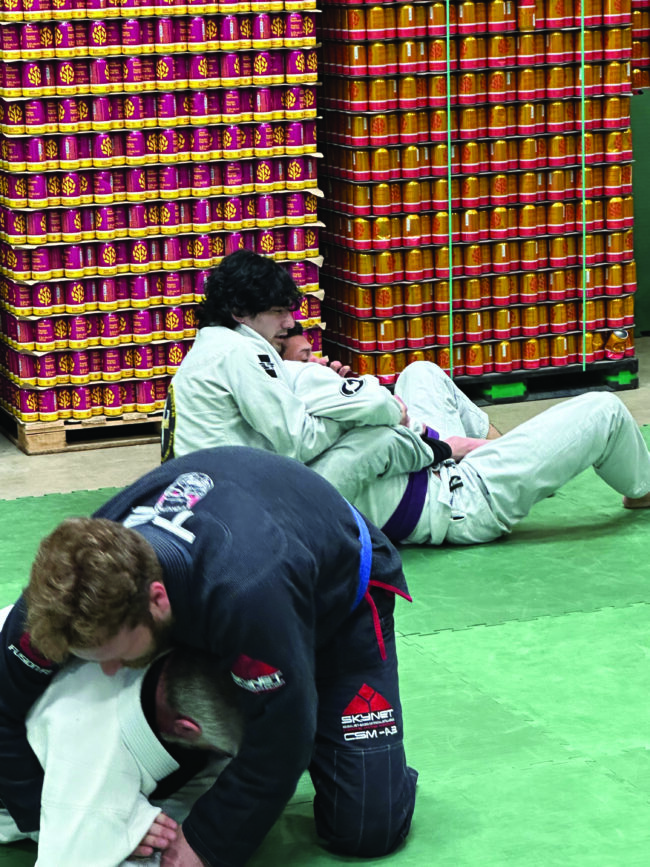Chokes and Barley gets jiu-jitsu fighters to tap in
Kelly Clayton
Contributing Writer

What goes well with beer? Nuts? Pretzels? How about both?
While patrons usually come into Lively Beerworks to drink local beer, this past Saturday the brewery owned up the “lively” part of its name, hosting a local community, looking to choke the spirits out of one another.
This original seminar series, Chokes and Barley, combines craft beer and jiu-jitsu, yielding a fellowship of nuts, looking to twist each other into pretzels. The “nuts,” so to speak, are harvested from local Oklahoma dojos. The pretzels are served up by the effective techniques and tactics of the fighting sport.
While not your typical fight club warehouse, local breweries do provide enough space for attendees to roll around in battle with anticipation of post-combat liquid offerings.
Event organizers Therman Lee and his instructor, Thomas Williams, came up with the concept after seeing a similar event, and saw the benefits of having these seminars via local breweries, to get a variety of instructors and students to “get out of the gym and have kind of a community event out of it,” Lee said.

“It’s combining two ingredients into a seminar,” said Lee. “When you have seminars at a gym, it causes two problems — one, if it’s your gym, it just feels kind of like another class; the other part of that is, it doesn’t do a lot to bring in other schools that are not directly affiliated with your school.
I’m trying to spread that love of community and jiu-jitsu around to other places,” he said. “I just want to get people outside of the gym and bring people together that wouldn’t normally get together. And you can all socialize and hang out.”
Jiu-jitsu is a form of martial arts that involves ground fighting and grappling, forcing an opponent into submission. Chokeholds are often a dominant move, forcing the victim into such a vulnerable position that they have no other choice but to tap out.
The combat sport originated in Japan in the form of judo, then was modified in Brazil, focusing more on applying leverage on an opponent instead of throws. This allows smaller, weaker challengers to use their opponents’ strength and body weight against them.
Not a commonly recognized form of martial arts for a long time, it gained international notoriety when Royce Gracie, now a legend in the sport, won the first two UFC championships in 1993 and 1994, defeating much larger opponents using this style. Competitors soon took notice.
Jiu-jitsu has also been adopted by others as a great way to exercise. Susan Ormston, one of several women who attended the seminar, has been training in the sport for nearly 13 years.
“Back when I started, there were few women in the gym,” Ormston said. “There’s been more trickling in through the years. I don’t like exercising, but this is a good exercise. It keeps me fit — my mind, my body — and it has a great purpose behind it: a little self-defense. And it’s a great community.”
The community was a common theme amongst attendees.
“It’s a good place to socialize,” Lee said. “You also get to meet awesome multi-time world champions that you wouldn’t otherwise get to meet.”
The events feature renowned athletes in the sport who come to teach their personal styles and techniques. This seventh installment of Chokes and Barley offered presentations from highly-regarded local instructor Michael South, and was headlined by special guest, two-time Black Belt World Champion, Renato Canuto.
South kicked off the morning’s festivities by demonstrating his skills and explaining afterwards, “being a smaller guy, I wanted to learn how to defend myself against larger, stronger, more athletic opponents.”
After practicing martial arts for years, South wrestled an opponent from a much lower rank according to belt color.
“And there was nothing I could do. He took me down, submitted me over and over,” South said. “‘I guess I have to learn that.’ Over the years, I prioritized jiu-jitsu over the other martial arts I was doing, and now it’s pretty much my main thing. I own a school and I teach every day. I love it.”
After South’s showcase of talent, Canuto showed his prowess of the art. Canuto gave a presentation and demonstrated moves, putting several lucky participants into submission holds, revealing his tricks and answering questions.
“I always had confidence,” Canuto said. “It helped me focus on the things I actually wanted to be good at, or in school, being respectful, knowing when to listen or when to talk, how to treat others with respect.”
After about a three-hour seminar and demonstration, the fighters all gathered for libations in the brewery’s front half. No longer fighting, they were eating off of each others’ plates, drinking after each other.
“We sweat into each other’s mouths,” Lee said. “When we go out, other people are like, ‘What are they doing? Interacting so closely.’” It’s because you lose that bubble of space around each other, around your training partners. As long as you maintain hygiene, it feels like nothing.”

